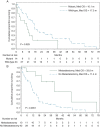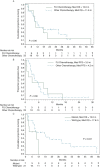Multicenter retrospective analysis of metastatic colorectal cancer (CRC) with high-level microsatellite instability (MSI-H)
- PMID: 24585723
- PMCID: PMC4072907
- DOI: 10.1093/annonc/mdu100
Multicenter retrospective analysis of metastatic colorectal cancer (CRC) with high-level microsatellite instability (MSI-H)
Abstract
Background: The microsatellite instability-high (MSI-H) phenotype, present in 15% of early colorectal cancer (CRC), confers good prognosis. MSI-H metastatic CRC is rare and its impact on outcomes is unknown. We describe survival outcomes and the impact of chemotherapy, metastatectomy, and BRAF V600E mutation status in the largest reported cohort of MSI-H metastatic colorectal cancer (CRC).
Patients and methods: A retrospective review of 55 MSI-H metastatic CRC patients from two institutions, Royal Melbourne Hospital (Australia) and The University of Texas MD Anderson Cancer Center (United States), was conducted. Statistical analyses utilized Kaplan-Meier method, Log-rank test, and Cox proportional hazards models.
Results: Median age was 67 years (20-90), 58% had poor differentiation, and 45% had stage IV disease at presentation. Median overall survival (OS) from metastatic disease was 15.4 months. Thirteen patients underwent R0/R1 metastatectomies, with median OS from metastatectomy 33.8 months. Thirty-one patients received first-line systemic chemotherapy for metastatic disease with median OS from the start of chemotherapy 11.5 months. No statistically significant difference in progression-free survival or OS was seen between fluoropyrimidine, oxaliplatin, or irinotecan based chemotherapy. BRAF V600E mutation was present in 14 of 47 patients (30%). BRAF V600E patients demonstrated significantly worse median OS; 10.1 versus 17.3 months, P = 0.03. In multivariate analyses, BRAF V600E mutants had worse OS (HR 4.04; P = 0.005), while patients undergoing metastatectomy (HR 0.11; P = <0.001) and patients who initially presented as stage IV disease had improved OS (HR 0.27; P = 0.003).
Conclusions: Patients with MSI-H metastatic CRC do not appear to have improved outcomes. BRAF V600E mutation is a poor prognostic factor in MSI-H metastatic CRC.
Keywords: BRAF V600E mutation; chemotherapy; colorectal cancer; metastatectomy; microsatellite instability-high; survival.
Figures


Similar articles
-
Prognostic value of BRAF V600E mutation and microsatellite instability in Japanese patients with sporadic colorectal cancer.J Cancer Res Clin Oncol. 2017 Jan;143(1):151-160. doi: 10.1007/s00432-016-2275-4. Epub 2016 Sep 26. J Cancer Res Clin Oncol. 2017. PMID: 27672042
-
Outcomes for Metastatic Colorectal Cancer Based on Microsatellite Instability: Results from the South Australian Metastatic Colorectal Cancer Registry.Target Oncol. 2019 Feb;14(1):85-91. doi: 10.1007/s11523-018-0615-9. Target Oncol. 2019. PMID: 30659494
-
Impact of BRAF mutation and microsatellite instability on the pattern of metastatic spread and prognosis in metastatic colorectal cancer.Cancer. 2011 Oct 15;117(20):4623-32. doi: 10.1002/cncr.26086. Epub 2011 Mar 31. Cancer. 2011. PMID: 21456008 Free PMC article.
-
Pathological complete response with anti-PD-1 therapy in a patient with microsatellite instable high, BRAF mutant metastatic colon cancer: a case report and review of literature.Discov Med. 2016 May;21(117):341-7. Discov Med. 2016. PMID: 27355330 Review.
-
[BRAF V600E-mutant colorectal cancers: Where are we?].Bull Cancer. 2020 Sep;107(9):881-895. doi: 10.1016/j.bulcan.2020.04.017. Epub 2020 Jul 14. Bull Cancer. 2020. PMID: 32674932 Review. French.
Cited by
-
Rare DNA Mismatch Repair-Related Protein Loss in Patients with Intrahepatic Cholangiocarcinoma and Combined Hepatocellular-Cholangiocarcinoma and Their Response to Immunotherapy.Cancer Manag Res. 2021 May 31;13:4283-4290. doi: 10.2147/CMAR.S304281. eCollection 2021. Cancer Manag Res. 2021. PMID: 34113169 Free PMC article.
-
Twist1-induced epithelial-mesenchymal transition according to microsatellite instability status in colon cancer cells.Oncotarget. 2016 Aug 30;7(35):57066-57076. doi: 10.18632/oncotarget.10974. Oncotarget. 2016. PMID: 27494849 Free PMC article.
-
Liver abscess after drug-eluting bead chemoembolization in patients with metastatic hepatic tumors.Br J Radiol. 2022 Jan 1;95(1129):20211056. doi: 10.1259/bjr.20211056. Epub 2021 Nov 29. Br J Radiol. 2022. PMID: 34762523 Free PMC article.
-
Associations of different immune checkpoints-expressing CD4+ Treg/ T cell subsets with disease-free survival in colorectal cancer patients.BMC Cancer. 2022 Jun 2;22(1):601. doi: 10.1186/s12885-022-09710-1. BMC Cancer. 2022. PMID: 35655158 Free PMC article.
-
Microsatellite instability: a review of what the oncologist should know.Cancer Cell Int. 2020 Jan 13;20:16. doi: 10.1186/s12935-019-1091-8. eCollection 2020. Cancer Cell Int. 2020. PMID: 31956294 Free PMC article. Review.
References
-
- Lothe RA, Peltomaki P, Meling GI, et al. Genomic instability in colorectal cancer: relationship to clinicopathological variables and family history. Cancer Res. 1993;53:5849–5852. - PubMed
-
- Thibodeau SN, Bren G, Schaid D. Microsatellite instability in cancer of the proximal colon. Science. 1993;260:816–819. - PubMed
Publication types
MeSH terms
Substances
Grants and funding
LinkOut - more resources
Full Text Sources
Other Literature Sources
Medical
Molecular Biology Databases
Research Materials

